
International Journal of Health Geographics
Scope & Guideline
Pioneering research for a healthier, more informed world.
Introduction
Aims and Scopes
- Spatial Analysis of Health Outcomes:
The journal publishes research that employs spatial analysis to investigate health outcomes, such as the distribution of diseases, health behaviors, and risk factors across different geographic areas. - Environmental Health Studies:
A significant focus is on the relationship between environmental factors—such as air quality, greenspaces, and urban design—and health, exploring how these elements impact public health. - Inequalities and Disparities:
Research addressing health disparities related to socioeconomic status, geography, and access to healthcare services is prevalent, highlighting the social determinants of health. - Innovative Methodologies:
The journal emphasizes cutting-edge methodologies, including machine learning, remote sensing, and participatory mapping, to enhance the understanding of health geography. - Public Health Applications:
Research that translates geographic findings into public health applications, policy recommendations, and community interventions is a core component of the journal.
Trending and Emerging
- Impact of Urbanization on Health:
Recent studies are increasingly focusing on how urbanization influences health outcomes, examining factors such as urban greenspaces, air quality, and access to health services. - Geospatial Data Integration:
There is a growing trend towards integrating diverse geospatial data sources, including social media and mobile location data, to enhance the understanding of health behaviors and environments. - Climate Change and Health:
Research addressing the health impacts of climate change, particularly in relation to vector-borne diseases and environmental hazards, is gaining prominence, reflecting the urgent need to understand these connections. - Digital Health and Technology:
The use of digital health technologies, including virtual reality and machine learning, for health assessments and interventions is an emerging theme, showcasing innovation in health geography. - Community-Based Participatory Research:
There is an increasing emphasis on community engagement and participatory research methods, reflecting a shift towards more inclusive and locally relevant health geography practices.
Declining or Waning
- Traditional Epidemiological Studies:
There seems to be a waning interest in traditional epidemiological methodologies that do not incorporate spatial analysis or geographic information, as the field shifts towards more innovative and integrated approaches. - Basic Geographic Mapping:
Research that solely focuses on basic mapping techniques without integrating advanced spatial analysis or new technologies is becoming less common, as the field embraces more complex analyses. - Static Health Indicators:
The reliance on static health indicators without considering temporal changes or dynamic modeling appears to be declining, as researchers increasingly focus on spatiotemporal analyses.
Similar Journals

JOURNAL OF URBAN HEALTH-BULLETIN OF THE NEW YORK ACADEMY OF MEDICINE
Elevating public health discourse in urban landscapes.JOURNAL OF URBAN HEALTH-BULLETIN OF THE NEW YORK ACADEMY OF MEDICINE, published by Springer, stands at the forefront of interdisciplinary research, focusing on the complex interplay between urban environments and public health. With an impactful presence reflected in its Q1 rankings across the fields of Health (Social Science), Public Health, and Urban Studies, this journal is pivotal for researchers, practitioners, and policymakers interested in improving health outcomes in urban settings. The journal’s extensive scope spans a variety of critical topics from environmental health to social determinants of health, making it an essential resource for anyone committed to advancing urban health knowledge. Given its impressive Scopus rankings—#18 in Social Sciences (Health) and #15 in Urban Studies—the journal not only fosters a rich dialogue among experts but also serves as a vital platform for disseminating groundbreaking research. Furthermore, as an open-access publication, it ensures that its valuable insights are readily accessible, amplifying the reach and impact of research findings that shape policies and practices worldwide.
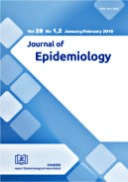
JOURNAL OF EPIDEMIOLOGY
Transforming data into impactful health strategies.JOURNAL OF EPIDEMIOLOGY is a premier peer-reviewed journal published by the JAPAN EPIDEMIOLOGICAL ASSOCIATION dedicated to advancing the field of epidemiology and public health. With an impressive impact factor and recognition as a Q1 journal in both the epidemiology and miscellaneous medicine categories, it ranks in the top percentile of its field, occupying the 28th position out of 148 journals in epidemiology according to Scopus. Since its inception in 1991, this open access journal has provided researchers, practitioners, and students with valuable insights and findings that shape healthcare policies and practices globally. The journal covers a broad range of topics within epidemiology, fostering a multidisciplinary approach to understanding and addressing health challenges. With a commitment to high-quality research and accessibility, the JOURNAL OF EPIDEMIOLOGY plays a crucial role in the dissemination of knowledge and best practices within the public health community.
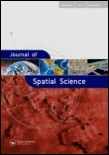
Journal of Spatial Science
Exploring the Frontiers of Spatial KnowledgeThe Journal of Spatial Science, published by Taylor & Francis Ltd, serves as a prominent platform for the dissemination of research in the interdisciplinary fields of geography, atmospheric science, and energy. With an ISSN of 1449-8596 and an E-ISSN of 1836-5655, this journal has established itself as a vital resource since its inception in 2004, boasting an impressive convergence period extending to 2024. Recognized in the Q3 quartile for Atmospheric Science and Energy (miscellaneous), and achieving a Q2 classification in Geography, Planning and Development in 2023, the journal not only reflects the evolving complexities of spatial science but also underscores its increasing relevance in addressing contemporary global challenges. The journal holds a commendable position in Scopus rankings, with notable placements in various categories, further highlighting its academic significance. Researchers, professionals, and students are encouraged to engage with the rich content offered, as the Journal of Spatial Science remains committed to advancing knowledge and fostering discussions pertinent to spatial analysis and its applications.
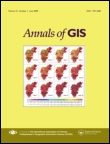
Annals of GIS
Advancing Geographic Insights for a Better TomorrowWelcome to the Annals of GIS, a leading academic journal published by Taylor & Francis Ltd, dedicated to advancing the field of Geographic Information Science and its applications. With an ISSN of 1947-5683 and an E-ISSN of 1947-5691, this Open Access journal has been ensuring wide accessibility since 2019, thereby bolstering the dissemination of knowledge in areas such as remote sensing, spatial analysis, and geoinformatics. Hailing from the United Kingdom, the journal ranks impressively within its categories, achieving a Q2 status in Computer Science Applications and a prestigious Q1 ranking in Earth and Planetary Sciences for 2023, placing it in the top 10% among its peers. With a focus on innovative research spanning from 2009 to 2024, the Annals of GIS serves as a vital platform for researchers, professionals, and students alike, providing insights and fostering discussions that push the boundaries of geographic technologies and their real-world applications.

Health Equity
Driving impactful change in health systems worldwide.Health Equity is an esteemed open-access journal published by MARY ANN LIEBERT, INC, dedicated to advancing knowledge in the fields of health information management, health policy, and public health. With an E-ISSN of 2473-1242 and a commendable Q1 ranking in multiple categories for 2023, including Health Information Management and Health Policy, this journal stands at the forefront of addressing the complexities of health disparities and promoting equitable healthcare solutions. By providing a platform for original research, critical reviews, and innovative methodologies since its inception in 2017, Health Equity plays a crucial role in facilitating dialogue among scholars, practitioners, and policymakers. The journal's commitment to open access ensures that its valuable content is freely available, fostering collaboration and knowledge dissemination within the global health community. As it converges from 2017 to 2024, Health Equity continues to empower its readership to drive impactful changes in health systems and policies worldwide.
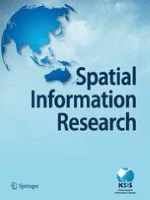
Spatial Information Research
Unveiling insights through innovative spatial research.Spatial Information Research, published by SPRINGER SINGAPORE PTE LTD, is a prominent journal committed to advancing the interdisciplinary field of spatial information science. With an ISSN of 2366-3286 and an E-ISSN of 2366-3294, this journal serves as a crucial platform for disseminating research findings from 2016 to 2024, focusing on applications in Artificial Intelligence, Computer Science Applications, and Geography, among others. Ranking in the Q2 and Q3 quartiles across various categories, it showcases impactful research that informs geographic planning, environmental sciences, and computational methodologies. The journal's rigorous peer-review process ensures high-quality contributions that offer insights for both academic scholars and industry professionals. While retaining exclusive access options, Spatial Information Research is a vital resource for researchers eager to explore the complexities of spatial data and its applications in real-world scenarios.
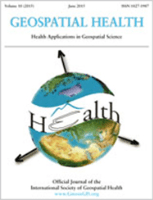
Geospatial Health
Unveiling Spatial Insights for Health Innovation.Geospatial Health is an esteemed academic journal dedicated to the intersection of geography, health policy, and social sciences, published by UNIV NAPLES FEDERICO II. Since its inception in 2006, this Open Access journal has been pivotal in disseminating valuable research that examines health-related issues through a geographical lens. With an impact factor that places it in the Q3 category across multiple disciplines including Geography, Health Policy, and Medicine, it serves as a vital resource for researchers, practitioners, and scholars alike. Located in Naples, Italy, the journal aims to foster interdisciplinary collaboration and provide insights that can influence policy and practice in health and environmental sectors. With its commitment to accessibility and high-quality research, Geospatial Health continues to enrich the fields it represents, inviting contributions that explore the intricate dynamics between health and spatial determinants.

GEOJOURNAL
Bridging Theory and Practice in Urban StudiesGEOJOURNAL, published by SPRINGER, is a distinguished academic journal that occupies a pivotal role in the fields of geography, planning, and development. With a robust ISSN of 0343-2521 and an E-ISSN of 1572-9893, it has been a cornerstone of scholarly communication since its inception in 1977. Operating from the Netherlands, GEOJOURNAL offers insightful research articles that delve into the dynamics of spatial analysis, environmental management, urban studies, and regional development, thus catering to a diverse readership of researchers, professionals, and students alike. The journal boasts an impressive Scopus ranking of #176 out of 821 in its category, positioning it in the top 22% percentile while maintaining a Q2 quartile ranking in Geography, Planning, and Development as of 2023. With access options available, GEOJOURNAL remains a vital platform for disseminating cutting-edge research and fostering academic collaboration, indispensable for those engaging with contemporary geographic challenges and innovative solutions. Engage with GEOJOURNAL to enrich your understanding and contribute to critical discussions in this ever-evolving field.
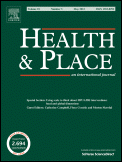
HEALTH & PLACE
Unveiling the Impact of Place on Health OutcomesHEALTH & PLACE is a premier academic journal published by Elsevier Science Ltd, focusing on the intersection of health and geographical contexts. With an impressive impact factor and a Q1 classification across multiple categories including Geography, Health (Social Science), and Public Health, this journal serves as an essential platform for disseminating groundbreaking research and innovative insights into how place influences health outcomes. Established in 1995, HEALTH & PLACE offers a comprehensive view of contemporary health challenges through a social science lens, making it invaluable for researchers, practitioners, and policymakers alike. Although it operates under a traditional subscription model, the high visibility afforded by its ranking—elevating it to the top tier of its field—ensures that its rigorous peer-reviewed articles reach a wide audience. With a convergence of critical topics relevant to life-span studies and environmental health, the journal not only enriches academic discourse but also informs practical applications in public health initiatives.
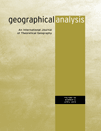
GEOGRAPHICAL ANALYSIS
Fostering Excellence in Earth-Surface AnalysisGEOGRAPHICAL ANALYSIS, published by WILEY, is a premier scholarly journal that has been at the forefront of geographical and earth-surface research since its inception in 1969. With an ISSN of 0016-7363 and an E-ISSN of 1538-4632, this journal has established itself as an essential resource for researchers and professionals in the fields of Earth-Surface Processes and Geography, Planning and Development, achieving impressive rankings of 13th and 60th in their respective categories according to Scopus, placing it in the Q1 quartile for both. The journal is renowned for its rigorous peer-reviewed articles that contribute valuable insights into spatial analysis, environmental impacts, and urban planning, thus fostering a deeper understanding of geographical phenomena. With access options available through traditional subscriptions, GEOGRAPHICAL ANALYSIS continues to serve as a critical platform for the dissemination of cutting-edge research and innovative methodologies, ultimately shaping the future of geographical inquiry and application.